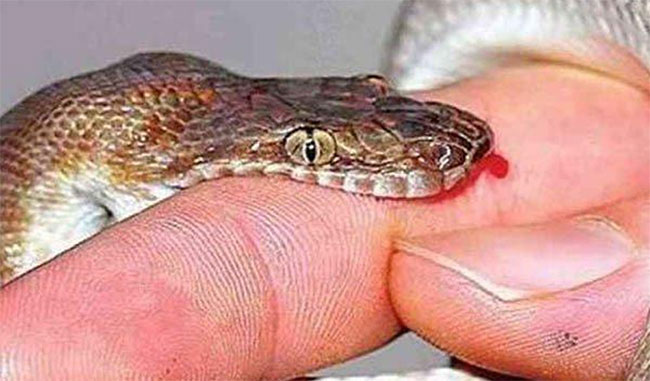Search for snake venom antidote thanks to anti-HIV technology
Scientists in the UK are working on a universal antidote against the venom of any snake living in Africa or India, significantly reducing the number of snakebite deaths.
The study is expected to help completely change the way snakebite cases are handled globally, because existing drugs are only effective against a small amount of venom. Among the 250 different species of venomous snakes, the diversity of deadly snake venom still poses many challenges for health workers around the globe.

Search for snake venom antidote thanks to anti-HIV technology.(Illustration).
The team, led by Professor Robert Harrison from the Liverpool Tropical Pharmacy School in the UK, is actively developing, testing an entirely new snake bite treatment, using the same technology that discovered resistance. HIV.
Professor Harrison said: 'We are trying to develop an entirely new treatment for snakebites, which is effective against the venom of all snakes in sub-African region. Sahara and India. In sub-Saharan Africa, 32,000 people die from snakebites each year, while in India, this number falls to about 46,000, equivalent to half of people dying from HIV. '
Currently, the snake venom drugs available on the market are mainly made by extracting the venom from the snakes themselves, before a very small, harmless dose from snake venom is injected into the horse. inherently immune to venom. This stimulates the horse's immune response to make antibodies and to get enough antibodies used in the preparation of the snakebite remedy, the snake venom must be injected to the horse several times a year, at intervals lasted a few years.
This will be a long and expensive process, not easy to do in many parts of the world, especially the poorest areas in Africa and India, where it is difficult to access antidote. However, a new direction in finding a promising and highly effective remedy that has been applied with various snake venom came after an American HIV scientist directly contacted her. Professor Harrison suggested that his team would conduct research on finding antibodies to snakebite wounds based on the method of identifying different antibody strains against the HIV virus.
The research conducted by Mr. Harrison's team has brought about positive results, but Professor Harrison said that creating a successful antidote will require about 4-5 years of preclinical work. , then at least 3 more years for production and clinical trials.
- Poisoned snake poison, first aid how?
- How to distinguish poisonous snakes and non-toxic snakes
- Development of antidote for snake venom based on antibodies to HIV
- There is going to be an antidote for all types of snakes
- Find serum to treat all snake bites for the poor
- People who were bitten by poisonous snakes a hundred times did not die
- Strangely, the man gave poisonous snakes regularly every week
- Steve Ludwin - who injects snake venom into people for 30 years to be younger and healthier
- Process of extracting venomous snake venom to make serum
- Horror of venomous snake venom makes human blood frozen like bloody soup
- What happens when you are bitten by a cobra
- Poisonous venom bee venom is no less than snake venom
- Snake venom resistant serum: Is it ever enough?
- Can snakes bite themselves with its venom?
 13 causes of non-itchy rash
13 causes of non-itchy rash How the mouse with human ears changed the world?
How the mouse with human ears changed the world? The truth about 'fried rice syndrome!
The truth about 'fried rice syndrome! What is dental implant?
What is dental implant?